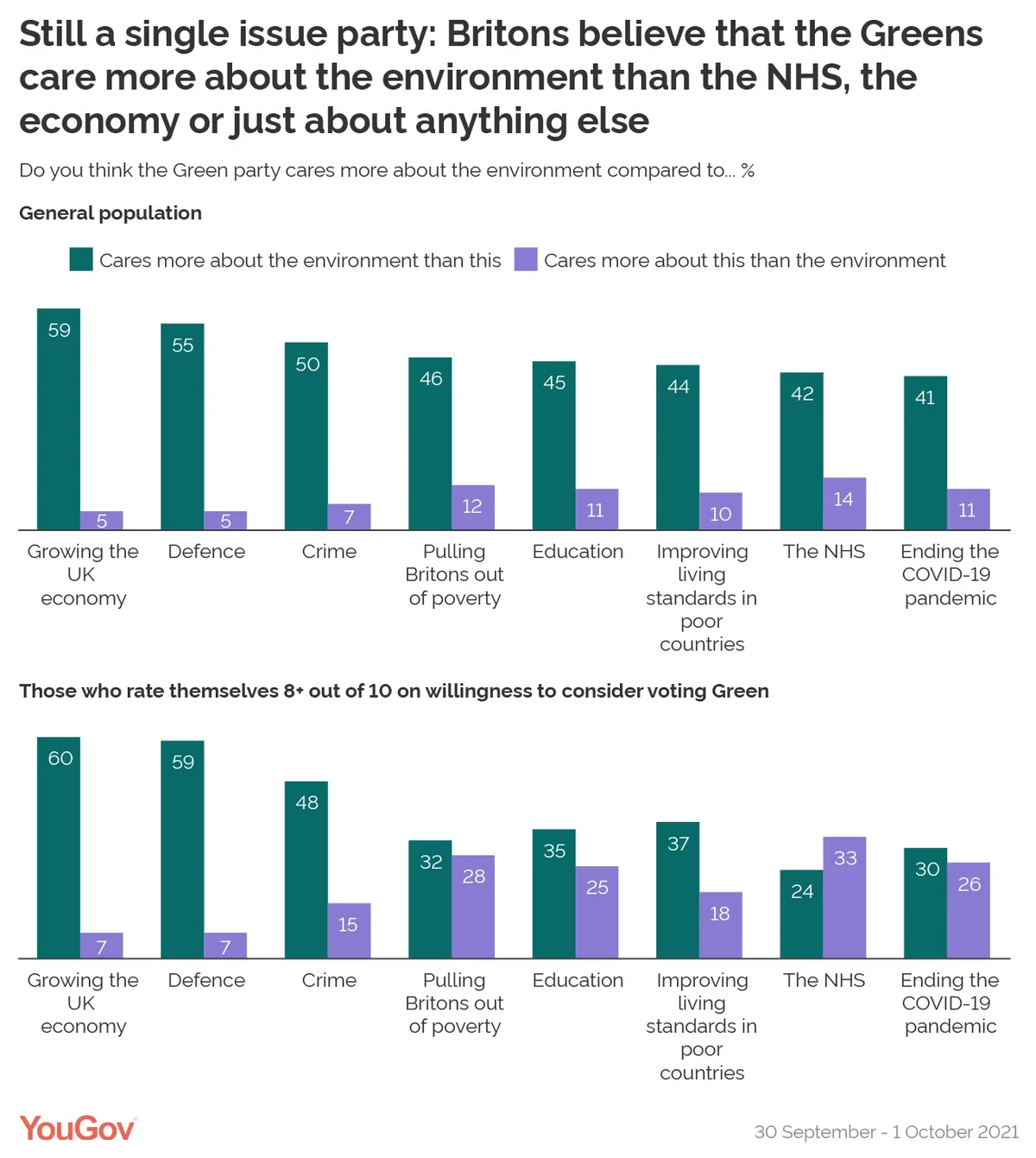Who might vote Green?
The Green party conference takes place over 22-24 October. The Greens are potentially the most interesting party in polling right now, with data showing they have improved their position nationally since the last general election and often poll on a par with the Lib Dems.
So what do Britons make of the Greens?
The Green party has a better image than other top parties…
The latest YouGov polling shows that four in ten Britons have a favourable opinion of the Green party, putting them ahead of Labour (34%), the Tories (32%), and the Lib Dems (28%). This is consistent with previous YouGov findings. They are also the only party to not have a negative net approval score (+1, compared to -24 for the Conservatives, -23 for the Lib Dems and -20 for Labour).
The Greens lack a figurehead, however. Caroline Lucas, almost certainly the most famous Green politician in Britain, still appears to be largely unfamiliar to the majority of people; 56% answered “don’t know” when asked what they thought of her.
That is a figure comparable to Lib Dem leader Ed Davey (61%), but far behind Labour leader Keir Starmer (18%) and prime minister Boris Johnson (10%).
…but how many people are willing to vote Green, and who are they?
In the latest YouGov voting intention survey, the Green party polled at 10% of the vote. But how big is the pool of potential voters who might be open to voting for the Greens, even if they don’t current intend to do so? We asked Britons on a scale of 0-10 how likely they would be to vote for the main political parties: on average the Greens scored 3.73, putting them behind Labour (4.44) and the Conservatives (4.07) but ahead of the Lib Dems (3.54).
Overall, 42% of Britons rated themselves a 5 or higher on likelihood to vote Green, including 16% who rated themselves an 8. 9 or 10.
Unsurprisingly, willingness to vote for the Greens is stronger among voters who backed parties from Britain’s left and centre. Approaching two thirds of Labour voters (65%) and Lib Dems (63%) rate themselves at 5/10 or higher to back the Greens. Three in ten Labour voters (29%) and a quarter of Lib Dems (26%) rate themselves 8/10 or higher. Among Conservatives these figures are only 21% and 3%, respectively.
The Greens appeal more to younger Britons. Among 18-24 year olds, 56% rate themselves 5+ in their willingness to consider voting Green, and 22% rate it at 8+. For those aged 25-49, 46% are at the 5+ level and 19% at the 8+ level.
But among those aged 65 and above, only 32% rate their willingness to consider voting Green at 5+, and just 12% say it’s an 8+. This will be an issue for the Greens, as it is for Labour, as older Britons are the most likely to actually turn out at elections.
Voting Green is also more of a middle class pursuit. While 46% of those in the ABC1 social group say their willingness to consider voting Green stands at 5/10 or above, and 20% say it stands at 8/10 or higher, among those in C2DE households those figures are 36% and 12% respectively.
Naturally, the Greens appeal the most to those who are more concerned about the environment. Among those who told us they think the environment is one of the top three issues facing the UK, 65% rated themselves a 5+ to consider voting Green, including 29% who rated themselves an 8+. For those who say the environment is the top issue facing Britain, those figures rise to 66% and 34% respectively.
However, for those who do not list the environment as a top issue facing the country, only 30% rate their willingness to think about backing the Greens at 5+, with just 10% rating it an 8+.
Do potential backers actually want the Greens to win?
While it is always a challenge in the UK for minor parties to attract votes, let alone win seats, it may not be great for the Greens that only a third of those who at one with them on the most pressing issue facing the country are highly willing to consider voting for them.
The Greens may be in a tricky situation, in that Britons – including potential party backers – don’t necessarily want them to win an election.
We asked Britons to pick which of three options they would prefer as a way of the UK government acting more effectively on climate change: by having a Green majority government, by having the Greens in government as a junior coalition member, or by the main parties taking the issue more seriously and the Greens not being in government.
Four in ten Britons (40%) prefer the option that keeps the Greens out of power, while 18% would prefer to see the Greens in government as a junior partner in a coalition, and only 7% want to see the Greens govern alone.
Even among those who rate themselves as 8/10 or higher in their willingness to consider voting for the Greens, only 27% want to see them win an election outright. They are more likely to prefer to see the party in a junior role (41%), although few want to see them out of power entirely (16%).
People trust the Greens on the environment, but nothing else
A recent YouGov survey of Green party members showed that just 17% thought the party should be a single issue party, focussing its time and energy on just the environment and climate change. Fully 79% wanted to see the party offer policy across a wide range of areas.
Unfortunately for most members, public opinion of the party sees it as a distinctly single issue party.
Most Britons (58%) say they trust the Greens a great deal or a fair amount when it comes to the environment. But no more than 31% say the same of the party for any other policy area, including 29% on health and 20% on the economy.
Few Britons think the Greens care about anything as much as they care about the environment. For instance, only 14% of Britons think the Greens care more about the NHS than the environment (the highest figure of any area we asked about) while 42% believe they are more concerned with green issues than the health service.
Even among the most staunch Green backers – those with an 8+ rating on likelihood to back the party – there is a tendency to believe the party cares more about the environment more than most issues except the NHS.










